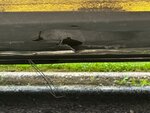

You get in your car to commute to work, turn your key to start your engine, and you are shocked as a roaring, blaring noise emits from your vehicle. You slowly realize the cause of the deafening sound—your catalytic converter was stolen.
Catalytic converter theft has been on the rise throughout the entire nation, and the crime has become a consistent problem in our own communities.
The increase in theft is particularly apparent in the hamlet of Islip Terrace. From March 2023 to December 2023, four catalytic converter thefts were officially reported in the hamlet to the Suffolk County Police Department throughout those 10 months. Yet, from Jan. 1 through Jan. 18 of this year, six catalytic converters were reported stolen, indicating a clear uptick in theft following the turn of the new year.
The theft comes at a high cost; while the cost of replacing a stolen catalytic converter varies by the make and model of vehicle, auto-body shops in the Islip Terrace area reported an average cost of replacement between $2,000 and $2,500.
These crimes are being committed with ease as the criminals are traveling in small groups, taking mere minutes to complete each theft in the dead of night.
Jennine DeLorenzo, who lives on Richard Avenue, witnessed a small group of individuals stealing the catalytic converter off her neighbor’s pickup truck at 3 a.m. this January.
“Once I realized what was happening, I quickly went to grab the phone, and before I knew it, they were just gone,” explained DeLorenzo. “They just said, ‘go, go, go,’ and they all jumped in their car and left. There were at least three, maybe four of them, and they left with the converter.”
It is easier to perform these thefts on SUVs than sedans, as it is easier to maneuver under the vehicle when it is higher off the ground. Still, individuals are managing to steal the converters from cars of all shapes and sizes.
Lauren Jackson, who lives on Audwin Street, assumed that her 2013 Volkswagen Beetle would be too low to the ground for her to become a victim of catalytic converter theft. Yet, when she went to drive to work one day last July, she realized her converter was stolen off her punch buggy in the middle of the night.
Outwardly, no one would be able to tell their catalytic converter was stolen until they started the car, as the thieves leave no trace, other than the missing part and potential damage to the underside of the vehicle.
“I checked underneath the car, and part of the plastic was cracked where they had jacked up the car, and there were wires hanging where they ripped off the sensors from the actual part,” explained Jackson.
Following the thefts, the catalytic converters are often sold to scrap metal yards for cash.
“We all know why they are doing it: for the value of the precious metals inside,” explained chief deputy sheriff Chris Brockmeyer. “I think we are going to have to continue to work with our scrap yards—and there are even places online where you can sell these—continue to work with them to make sure they are not buying products that were obtained illegally.”
“I think it is a horrible testament about how things are for some people. People would rather steal than work,” shared a victim who lives on Cedarhurst Street, who wished to remain anonymous.
According to Brockmeyer, while there may not be a lot of ways to directly deter catalytic converter theft, there are precautions that you may be able to take to decrease your chances of becoming a victim. If you have access to one, it is best to park your vehicle in a garage. If not, Brockmeyer recommends parking your vehicle in a well-lit area or in a driveway, rather than on the street. Car alarms can also be installed as a deterrent and would likely be more effective if the alarm has vibration sensing.
In addition to these deterrent measures, there are actions to protect yourself by helping law enforcement in the case of a potential theft.
“Some people may spray the converter with some type of bright paint. They may see that and not mess with it because it may create some curiosity from whoever they are selling it to,” explained Brockmeyer. “It is not necessarily going to stop them from stealing it. But it would be a means for law enforcement to help identify what is stolen and what is not.”
Lastly, you may consider installing motion-activated lights or a video surveillance system outside of your residence, which could potentially aid law enforcement in an investigation.
“I do not have a ring camera or surveillance camera,” shared Steven Chovnick of Islip Terrace, who fell victim to catalytic converter theft this January. “But that might change now.”